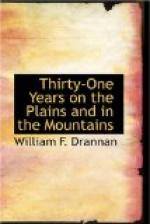About the first day in March, 1877, we started out on our summer’s campaign. I was now able to mount a horse by being assisted, but had to be very careful and only ride a short distance, and very slow at that. The third day on our trip from the fort George reported having seen the trail of quite a large band of Indians traveling westward almost parallel with the road, but said they had passed about two days before. I asked the Lieutenant to give me his camping places that night and the next one, which he did. I then told George to select four men from the scout force, take two days’ rations and see if he could run down the Indians and to telegraph me when they changed their course or when he had them located.
George was on their trail before noon and before sunset he had them located, only a short distance from the place where I had been wounded the year before. I got a dispatch from him just as I was ready to turn in for the night, and by one o’clock I received another dispatch stating that there were about eighty in the band, and well armed, and among them about twenty squaws and their children. This was something we had never seen among the Apaches before. Lieut. Jackson asked my opinion of their having their families with them. I told him I thought they must be on their way to Sonora to trade, as at that time the Apaches had never traded but very little with the whites.
They might be out for a hunt, but it was not customary when on such a trip to have their families with them. Upon the receipt of the second dispatch from George, Lieut. Jackson started out with three companies of cavalry, and arrived at the spot near daybreak. I was told afterwards that George had been crawling around all night getting the location of the Indians, the general lay of the ground and to ascertain the best plan of attack, knowing it would be so late by the time the Lieutenant would arrive that he himself would have no time to spare, and he had a diagram drawn on a piece of envelope of the camp and surroundings, also had their horses located. When the Lieutenant was ready to make the attack George took four of the scouts and started to cut the horses off and prevent the Indians from getting to them, but it seemed as though when the cavalry started to make the charge the Indians’ dogs had given the alarm and a part of the Indians had made for their horses. At any rate when daylight came George was found some two hundred yards from the Indian encampment, with both legs broken and a bullet through his neck, which had broken it and four Indians lying near him dead, which he no doubt had killed, and his horse lay dead about a rod from where he lay. No one had seen him fall nor had heard a word from him after he gave the order to charge for the horses. About the middle of that afternoon they returned to camp with George’s body and seven others that were killed, and nineteen wounded soldiers. They had killed thirty-seven Indians and had taken all the squaws and children prisoners. After I had looked at the body of that once noble and brave form, but now a lifeless corpse, I told the Lieutenant that I was ready to leave the field, for there was not a man in the entire army that could fill his place, and without at least one reliable man in the field it would be impossible to accomplish anything.




